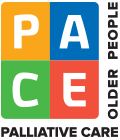Comparing the effectiveness of PAlliative Care for Elderly people in long-term care facilities in Europe
Abstract project
Societies in the EU are aging, leading to the need not only to improve health by prevention but also to improve quality of life and enabling people to live and die well. Whilst many countries aim to enable people to live in their own homes, many older people will require long term institutional care at the end of life. Governments are struggling to provide high-quality long-term care for people with chronic advanced diseases and reduced functional and/or cognitive capacities in long term care facilities. While a growing number of older people would benefit from a palliative care approach in long term care facilities, palliative care has only recently begun to be developed in these settings.
The overall aim of the PACE project was to develop tools to assist practitioners and policy- and decision-makers to make evidence-based decisions regarding best palliative care practices in long-term care facilities in Europe. PACE helped to achieve the objectives of the European 2020 Strategy, specifically the European Innovation Partnership on Active and Healthy Ageing. Ultimately this will lead to optimizing the delivery of palliative care to the large proportion of EU citizens living and dying in old age.
PACE is the acronym of a Collaborative research project financed by the European Commission (7th Framework Programme, Health 2013 Innovation, and Grant Agreement No: 603111). The full project name is: comparing the effectiveness of PAlliative Care for Elderly people in long term care facilities in Europe. It started on February 1, 2014 and ended five years later – in February 2019.
The PACE project was built on a consortium of 12 partners, consisting of eight research institutes, spanning six European countries, and four European organizations responsible for impact and dissemination.

More information
-
PACE Mapping palliative care systems in care or nursing homes in Europe
-
PACE Study I: Large-scale cross-sectional study to examine end-of-life care of deceased residents in care or nursing homes in Europe
-
PACE Study II: Phase III randomized controlled cluster trial to study the impact of a palliative care intervention
-
PACE Intervention: Development of an intervention to integrate palliative care in care or nursing homes
-
PACE Impact: Impact and dissemination towards policy and practice
Partners
- EMGO Institute for Health and Care Research, VU University Medical Center, Amsterdam, the Netherlands
- End-of-Life Care Research Group, Vrije Universiteit Brussel & Ghent University, Brussels, Belgium
- Ghent University, Department of Geriatric Medicine, Ghent, Belgium
- Hôpitaux Universitaires de Genève, Genève, Switzerland
- International Observatory on End of Life Care, Lancaster University, Lancaster, United Kingdom
- National Institute for Health and Welfare (Terveyden Ja Hyvinvoinnin Laitos), Helsinki, Finland
- Radboud university medical centre, Department of Anesthesiology, Pain and Palliative Medicine, Nijmegen, The Netherlands
- Università Cattolica del Sacro Cuore, Rome, Italy
- Uniwersytet Jagiellonski, Kraków, Poland
- HUG - Geneva University Hospitals, Geneva, Switzerland


